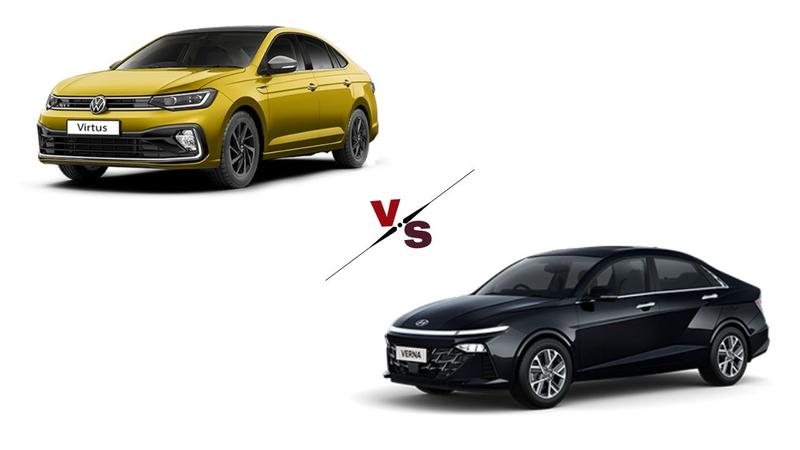Published 13:22 IST, December 17th 2024
Volkswagen Virtus vs Hyundai Verna: Which Car Should You Pick?
The Volkswagen Virtus competes with the Hyundai Verna. Here is a comparison of Virtus and Verna that will help buyers to select the right pick:

Virtus vs Verna: The D-segment sedan in India offers a limited options to the buyers. Buyers have an option to select from Maruti Suzuki Ciaz, Honda City, Hyundai Verna, Skoda Slavia and Volkswagen Virtus in this segment.
The Volkswagen Virtus has a bold styling, spacious interiors and powerful turbo petrol engines on offer. It offers features such as front-ventilated seats, a sunroof, automatic climate control, and more. On the other hand, the Hyundai Verna offers a sleek design, spacious and comfortable interiors and two petrol engines. It offers features such as 64 colours for ambient lighting, automatic climate control, front-ventilated seats, and more.
Here is a feature-by-feature comparison of the Volkswagen Virtus and Hyundai Verna, that will help buyers to select the right sedan:
Volkswagen Virtus vs Hyundai Verna: Price
The price of the Volkswagen Virtus starts at Rs 11.56 lakh (ex-showroom) for the base variant. The price of Hyundai Verna is Rs 11.00 lakh (ex-showroom) for the base variant.
Volkswagen Virtus vs Hyundai Verna: Exteriors
The exterior design of the Volkswagen Virtus has bold styling. It comes with LED headlamps and LED DRLs. On the other hand, the Hyundai Verna offers a split setup for the headlamps and DRLs. It has a long LED bar for the DRL.
On the side, both Verna and Virtus run on 16-inch tyres. The Virtus is slightly longer and taller than the Verna. On the other hand, the Verna has a longer wheelbase.
At the rear, the Hyundai Verna has a connected LED taillamps. The Virtus offers a regular split setup for the taillamps. On paper, the Verna has a better boot space than the Virtus.
Volkswagen Virtus vs Hyundai Verna: Interiors
On the inside, the dashboard layout is different in both sedans. The Hyundai Verna gets a 10.25-inch connected screens for the infotainment and instrument cluster. On the other hand, the Volkswagen Virtus has a separate 10.25-inch instrument cluster and a 11.8-inch infotainment screen.
Talking about the steering wheel, the Virtus comes with a three spoke D-cut steering wheel and the Verna comes with a two-spoke unit. The rear seat space in both these sedans is similar. Both the sedans offer five headrests and the rear seats offer an armrest as well.
Volkswagen Virtus vs Hyundai Verna: Features
Both the sedans offer a decent feature list. For starters, Virtus has automatic climate control, a sunroof, front-ventilated seats, cylinder-deactivation technology for better fuel efficiency and more. For safety, Virtus comes with six-airbags, ABS, and traction control.
On the contrary, Verna offers a 64 colour ambient lighting, front ventilated seats, electronic parking brake and more. For safety, Verna is equipped with Level-2 ADAS features, six airbags, ABS, EBD.
Volkswagen Virtus vs Hyundai Verna: Engine Specifications
The Volkswagen Virtus is powered by a 1.0-litre inline three-cylinder TSi engine, producing 115 BHP and 170 Nm torque, mated to a six-speed manual and a torque converter gearbox. The second engine is a 1.5-litre inline four-cylinder TSI EVO motor, producing 150 BHP and 253 Nm torque, mated to a six-speed manual and a seven-speed DCT gearbox.
Hyundai Verna is powered by a 1.5-litre inline four cylinder naturally aspirated petrol engine, which produces 115 BHP and 145 Nm torque, mated to a six-speed manual or an IVT gearbox. There is a 1.5-litre turbo petrol engine as well, which produces 160 BHP and 253 Nm torque, mated to a six-speed manual or a seven-speed DCT gearbox.
Updated 15:49 IST, December 17th 2024




